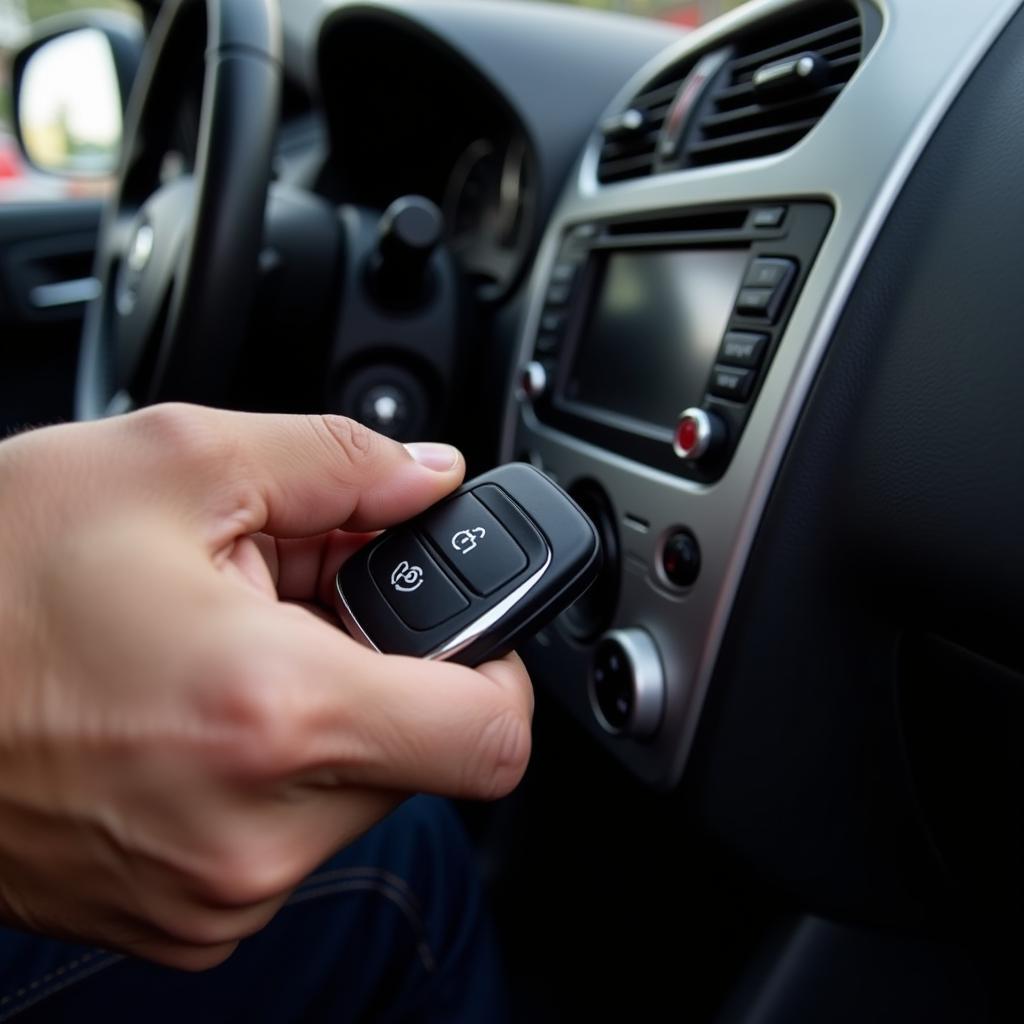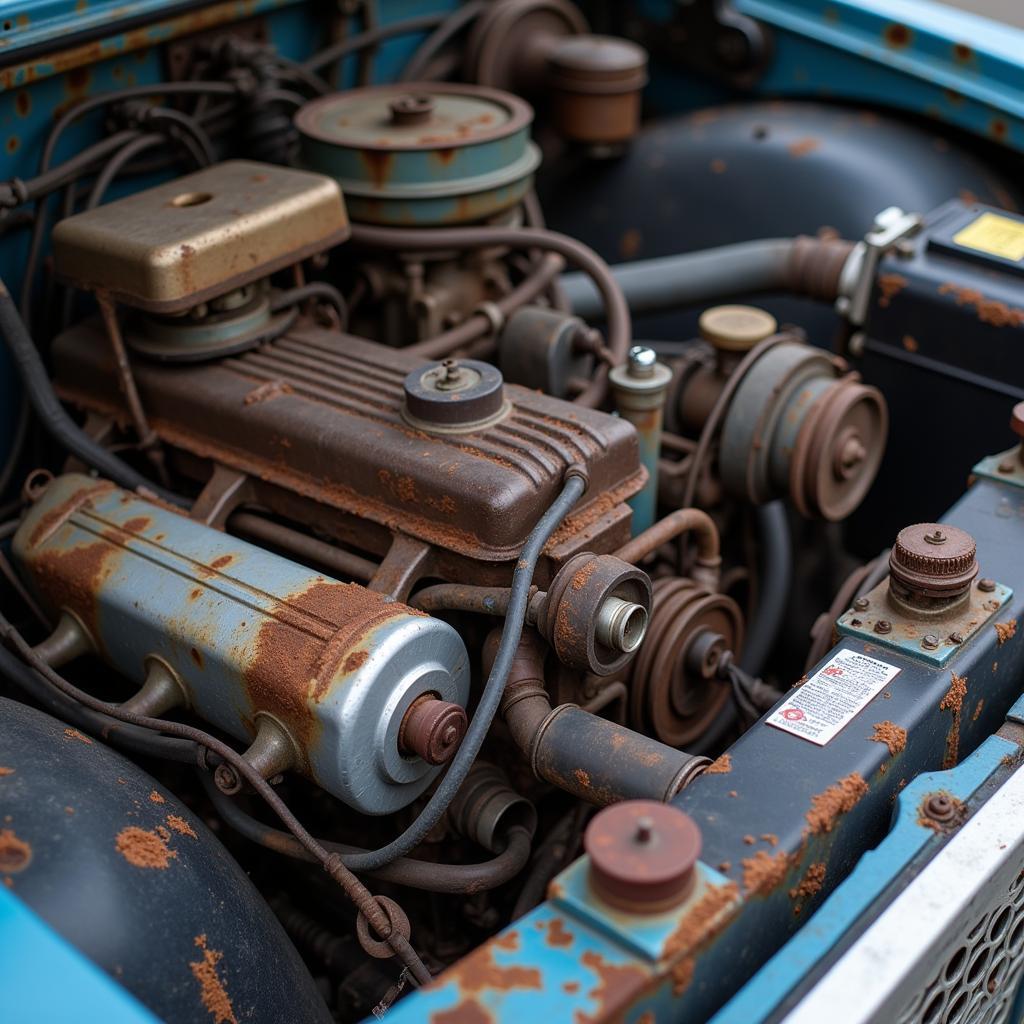Can A Water Damaged Car Be Fixed? This is a question that plagues many car owners after floods, hurricanes, or even a simple overflowing riverbank. The answer, unfortunately, isn’t a simple yes or no. It depends on several factors, from the extent of the water damage to the age and value of the vehicle. This comprehensive guide will delve into the complexities of water-damaged cars, providing you with the knowledge to make informed decisions about repair or replacement.
The aftermath of a flood can be devastating, leaving behind a trail of damaged property, including vehicles. Water damage to a car is not just about a wet interior. Water can wreak havoc on the car’s electrical system, engine, transmission, and even the frame. Determining the severity of the damage is crucial in deciding whether the vehicle can be salvaged.
Assessing the Damage: How Bad is it, Really?
The first step in determining whether a water-damaged car can be fixed is to assess the extent of the damage. This involves checking the water line, inspecting the electrical system, and examining the mechanical components. Was the car submerged up to the dashboard, or just the floor mats? The higher the water level, the greater the potential for extensive damage. Check for visible signs of water damage, such as mildew, rust, and corrosion.
Electrical System Woes: The Silent Killer
Water and electricity don’t mix. Even seemingly minor water intrusion can short-circuit sensitive electronic components, leading to malfunctions in the car’s computer, airbags, and other essential systems. Diagnosing electrical problems can be time-consuming and costly.
Mechanical Mayhem: Engine and Transmission Troubles
If water has entered the engine or transmission, significant mechanical problems can arise. Water can contaminate engine oil and transmission fluid, leading to internal damage and reduced performance. In some cases, a complete engine or transmission replacement might be necessary. Fixing rusted car floor can also be a major undertaking.
Is it Worth Fixing? The Cost Factor
Once the damage assessment is complete, the next crucial question is whether the repair cost is justifiable. Consider the car’s age, pre-damage value, and the estimated repair costs. If the repair costs exceed the vehicle’s value, it might be more economical to consider it a total loss. If you are looking for the cheapest way to fix a car dent, this might not be the article for you, as water damage is a much more serious issue.
Insurance Considerations: Will They Cover It?
If your car is insured, contact your insurance company immediately. They will send an adjuster to assess the damage and determine the coverage. Depending on your policy, the car may be declared a total loss, and you’ll receive a settlement based on the vehicle’s pre-damage value.
DIY or Professional Repair: Choosing the Right Path
While minor water damage, such as wet carpets, might be tackled with DIY methods, extensive damage requires professional expertise. A qualified mechanic has the knowledge, tools, and experience to diagnose and repair complex issues, including electrical and mechanical problems. You might even need to know how to fix an over extended car door or fix cracked bumper on car, depending on the extent of the damage.
“Water damage is deceptive. What appears to be a minor issue on the surface can often mask extensive underlying problems. A thorough inspection by a qualified professional is paramount,” says John Miller, a seasoned automotive technician with over 20 years of experience.
Preventing Future Water Damage: Lessons Learned
Protecting your car from future water damage is crucial. Park your car in a garage or on higher ground during floods or heavy rains. Regularly check for leaks and address them promptly. Simple preventative measures can save you from the hassle and expense of dealing with water damage.
“Regular maintenance is key to preventing future problems. This includes checking seals, drain plugs, and ensuring your car’s drainage system is functioning correctly,” advises Sarah Johnson, a leading automotive consultant. For instance, knowing how to google search how to fix headliner in car can be surprisingly helpful in preventing water damage.
Conclusion: Can a Water Damaged Car Be Fixed? It Depends.
So, can a water damaged car be fixed? The answer ultimately depends on the extent of the damage and the associated costs. A thorough assessment, considering both the visible and hidden damage, is crucial in making an informed decision. While some water damage is repairable, severe cases might necessitate replacing the vehicle. Contact us at AutoTipPro, +1 (641) 206-8880, 500 N St Mary’s St, San Antonio, TX 78205, United States, for expert advice and assistance in dealing with your water-damaged car.
FAQ
-
What is the first thing I should do if my car is flooded? Contact your insurance company immediately and do not attempt to start the vehicle.
-
Can I drive a water-damaged car? No, driving a water-damaged car can exacerbate the damage and pose safety risks.
-
How long does it take to fix a water-damaged car? The repair time varies depending on the severity of the damage, ranging from a few days to several weeks.
-
Does water damage affect the resale value of a car? Yes, even after repairs, a history of water damage can significantly impact a car’s resale value.
-
Is it safe to buy a repaired water-damaged car? Proceed with caution. Ensure a thorough inspection by a trusted mechanic before purchasing a repaired water-damaged car.
-
What are the common signs of hidden water damage in a car? Musty odors, corrosion, electrical malfunctions, and unexplained mechanical problems can indicate hidden water damage.
-
How can I prevent mold growth in a water-damaged car? Thoroughly dry the interior and remove all wet materials as soon as possible. Use a dehumidifier and disinfectant to prevent mold growth.






Leave a Reply